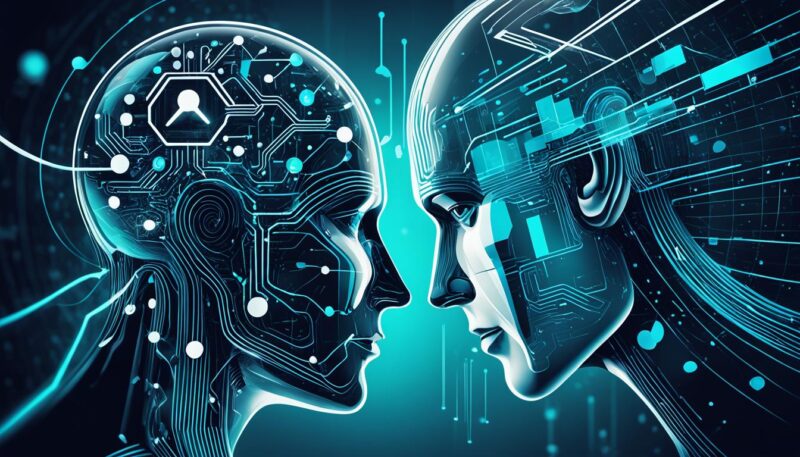Imagine a world where technology continuously redefines our reality, weaving its way into every industry and discipline. In the heart of this technological surge lies data science, a domain marked by its relentless pursuit of extracting meaningful insights from data.
If you’ve ever found yourself marveling at the intricate dance between vast data sets and the human intellect that deciphers them, you’re not alone. If you wish to explore this fascinating field, consider enrolling in a data science online course to gain a deeper understanding of its principles and applications. The query that looms large is whether AI will replace data analysts, challenging us to rethink the future of data science.
As professionals, the anxiety regarding AI’s role in data interpretation is palpable. Data analysts, once the unchallenged guardians of data-driven decision-making, now face the question of evolving data analyst roles in an AI-augmented landscape. This article embarks on a journey to explore the coexistence of AI and data analysts, shedding light on the immense potential and the inevitable challenges.
Key Takeaways
- AI’s impact on the future of data science is profound and transformative.
- The role of AI in data interpretation is growing, enhancing efficiency.
- Data analysts will need to adapt and evolve their skills to stay relevant.
- The evolving data analyst roles emphasize collaboration with AI tools.
- Understanding data science trends is crucial for professionals in the field.
Impact of AI on Data Analysis Roles
AI is profoundly transforming data analysis roles and the utilization of data analysis tools. By leveraging automation in data analytics, AI helps streamline previously tedious tasks and paves the way for new opportunities in analytical roles.
The Evolving Role of Data Analysts
The role of AI in analytics is reshaping the traditional functions of data analysts. Historically tasked with labor-intensive activities like data collection and verification, analysts now benefit from the automation in data analytics that handles repetitive processes efficiently. AI’s capabilities in advanced computation allow analysts to focus more on strategic decision-making and insight-driven analysis.
Moreover, the advent of machine learning in data analysis has equipped analysts to identify sophisticated patterns and trends within vast datasets, fostering a shift towards more advisory and consultative roles. This evolution encourages data analysts to expand their skill sets, incorporating AI tools and techniques.
AI Integration in Data Analysis Tools
The integration of AI into data analysis tools enhances their functionality and effectiveness. Platforms such as Tableau, Polymer, and Microsoft Power BI are just a few examples of how AI impact on data analysis is creating dynamic and interactive visualizations from static spreadsheets. These AI-powered tools enable analysts to manage large datasets with unprecedented speed and accuracy.
The role of AI in analytics goes beyond mere automation; it calls for data analysts to master AI for complex tasks, including predictive analytics and natural language processing. Embracing these technological advancements ensures that analysts remain at the forefront of data interpretation, driving innovation and more profound insights in their work.
Will AI Replace Data Analysts?
The future of data analysis prompts ongoing discussions about whether AI will ultimately replace human data analysts. However, a collaborative relationship between AI and human analysts is emerging, revealing a nuanced approach to data-driven decision-making.
The Symbiotic Relationship Between AI and Data Analysts
While AI excels at processing massive amounts of data efficiently, it complements human analysts who offer critical thinking, strategic planning, and problem-solving skills. This symbiotic relationship between AI and data analysts allows businesses to leverage both AI’s computational power and human intuition effectively. Together, they can achieve more accurate and insightful data-driven decisions.

Limitations of AI Compared to Human Analysts
Despite its advanced capabilities, AI has limitations that highlight the importance of human analysts. AI may lack the contextual understanding, ethical considerations, and emotional intelligence that humans naturally possess. These limitations make human judgment indispensable, especially in cases requiring nuanced interpretation and creative solutions.
Future Job Market for Data Analysts
As the future job market for data analysts evolves, new roles are developing that integrate AI tools with human expertise. The demand for skilled analysts who can guide, interpret, and enhance AI capabilities is growing. These roles require a blend of technical proficiency with AI and the indispensable human qualities of creativity and ethical reasoning.
| AI Capabilities | Human Analyst Skills |
|---|---|
| High-speed data processing | Critical thinking |
| Pattern recognition | Strategic planning |
| Automation of repetitive tasks | Problem-solving |
| Data-driven decisions | Contextual understanding |
Conclusion
As we culminate the discourse on AI’s role in data science, it becomes clear that artificial intelligence heralds a transformative era of augmented analysis and decision-making. AI advancements offer unprecedented capabilities, but they do not render data analysts obsolete. Instead, they mark the evolution of the analyst’s role, where automation complements indispensable human faculties like interpretation, ethical judgment, and contextual insight.
The data analytics future outlook points to a synergistic relationship between AI tools and human expertise. Advanced algorithms bolster analytical processes, yet it remains the prerogative of skilled data analysts to wield these tools effectively, ensuring strategic outcomes are more insightful and actionable. Future trends underscore the balanced approach needed to leverage AI for data-driven decisions, highlighting the irreplaceable value of human ingenuity.
Looking ahead, the landscape is poised for a collaborative interaction of AI and human analysts—not as competitors but as partners in driving data science forward. Technological marvels in analytics promise to push the boundaries of what can be achieved, but the enduring value of human expertise assures that data analysts will continue to be indispensable architects in the edifice of data-driven decisions. This harmonious blend sets the stage for a promising future filled with enhanced growth and innovation in the data science domain.
Source Links
- https://www.forbes.com/sites/bernardmarr/2023/02/07/will-chatgpt-put-data-analysts-out-of-work/
- https://www.ccslearningacademy.com/will-ai-replace-data-analysts/
- https://www.geeksforgeeks.org/will-ai-replace-data-analysts/
Related Posts:
- Will AI Replace Software Engineers? The Truth Behind…
- AI-Powered Dating Apps - Will They Ever Replace…
- 5 Exciting 5G Use Cases and Their Future Network Impact
- The Benefits, Potential, and Future of Edge Computing
- Why AI is the Future of Business Growth and How to…
- The Future of Quantum Computing and Cryptocurrency:…







